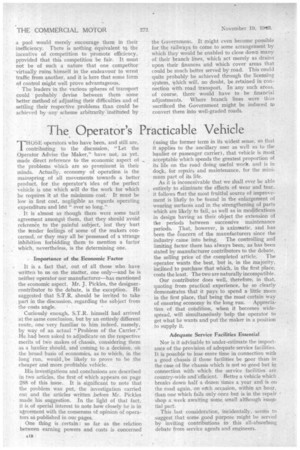The Operator's Practicable Vehicle "THOSE operators who have been, and
Page 20

If you've noticed an error in this article please click here to report it so we can fix it.
still are, contributing to the discussion, "Let the Operator Advise the Maker," have not, as yet, made direct reference to the economic aspect of the 'problems which are so prominent in their minds. Actually, economy of operation is the mainspring of all movements towards a better product, for the operator's idea of the perfect vehicle is one which will do the work for which he requires it at the minimum cost. It must be low in first cost, negligible as regards operating expenditure and la*st " ever so long."
It is almost as though there were some tacit agreement amongstthem, that they should avoid referenCe. to the painful subject, lest they hurt the tender feelings of some of the makers concerned, or they may all be possessed of a -strange inhibition forbidding them to mention a factor which, nevertheless, is the determining one.
Importance of the Economic Factor It is a fact that, out of all those who have written to us on the matter, one only—and he is neither operator nor manufacturer—has mentioned the economic aspect. Mr. J. Pickles, the designercontributor to the debate, is the exception. He suggested that S.T.R. should be invited to take part in the discussion, regarding the subject from the costs angle.
Curiously enough, S.T.R. himself had arrived at the same conclusion, but by an entirely different route, one very familiar to him indeed, namely, by way of an actual "Problem of the Carrier." He had been asked to adjudicate on the respective merits of two makes of chassis, considering them as a haulier should, and coming to a decision, oh the broad basis of economics, as to which, in the long run, would, be likely to prove to be the cheaper and more profitable vehicle. .
His investigations and conclusions are described in two articles, the first of which appears on page 288 of this issue. It is significant to note that the problem was put, the investigation carried out and the articles written before Mr. Pickles made his suggestion. In the light of that fact, it is of special interest to note how closely he is in agreement with the consensus of opinion of operators as published in our pages.
One thing is certain : so far as the relation between earning powers and costs is concerned (using the former term in its widest sense, so that it applies to the ancillary user as well as to the haulier or passenger carrier), that vehicle is most acceptable which spends the greatest proportion of its life on the road doing useful work, and is in dock, for repairs and maintenance, for the minimum part of its life. As it is inconceivable that we shall ever be able entirely to .eliminate the effects of wear and tear, it follows that the most fruitful source of improvement is likely to be found in the enlargement of wearing surfaces and in the strengthening of parts which are likely to fail, as well as in modifications in design having as their object the extension of the periods between successive maintenance periods. That, however, is axiomatic, and has been the Concern of the manufacturers since the industry came into being. The controlling and limiting factor there has always been, as has been stated by manufacturer contributors to the debate, the selling price of the completed article. The operator wants the best, but is, in the majority, inclined to purchase that which, in the first place, costs the least. The two are naturally incompatible.
Our contributor does well, therefore; in that, quoting from practical experience, he so clearly demonstrates that it pays to spend a little more in the first place, that being the most certain way of ensuring economy in the long run. Appreciation of that condition, when it becomes widespread, will simultaneously help the operator to get what he wants and put the maker in a position to supply it.
Adequate Service Facilities Essential Nor is it advisable to under-estimate the importance of the provision of adequate service facilities. It is possible to lose more time in connection with a good chassis if those facilities be war than in the case of the chassis which is not so good but in connection with Which the service facilities are country-wide and efficient. Better a vehicle which breaks down half a dozen times a year and is on the road again, on etch ,occasion, within an hour,' than one which fails only once but is in the repair shop a week awaiting sonie small although 'essential part.
This last consideration, incidentally, seems to suggest that some good purpose might be served by inviting contributions to this all-absorbing debate from service agents and engineers.




























































